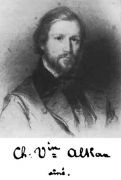
Charles-Valentin ALKAN
1813-1888

 |
Charles-Valentin ALKAN |
 |
'Enigma' was the description of Alkan by Antoine Marmontel, Head of Keyboard at the Paris Conservatoire in his book Les Pianistes Celèbres. Mediocrities simply do not understand greatness, nor sometimes does history and it is only in the last 50 years, since the 1960s, that Alkan's piano music started to be heard and assessed on a wider scale, thanks to two brilliant advocates: Raymond Lewenthal (1923-1984) and Ronald Smith (1922-2004), and in more recent times by (among others) Marc-André Hamelin and Mark Viner.
Charles-Valentin Alkan was born into the Jewish tradition in Paris in 1813 and remained a scholar of the ancient texts and the Bible all his life. Showing outstanding potential early in life – he won a prize for Solfège at the age of six. He also studied the violin, but it was the piano that was to dominate both his life and his composing. As a young man he won acclaim in the musical salons of Paris and counted Chopin and Liszt not as rivals but as personal friends. He was actually Chopin's next-door neighbour and it is believed that after Chopin's death in 1849 many of his pupils transferred to Alkan.
But this was not to last. Sometime during the late 1830s, and when a relationship with one of his married pupils led to the birth of an illegitimate son (Eli Miriam Delaborde, also renowned pianist later in life and one of the editor's of his father's publications) his life turned in a much more inward direction. Despite still making occasional concert appearances during the mid-late 1840s, he had become virtually a recluse by then; nevertheless, the period produced some of his most musically and technically demanding works. His two sets of Studies Op.35 (in all the Major keys) and Op.39 (the Minor keys) which reached heights of pianistic difficulty easily the equal of Liszt. Towards the end of his life he returned to the concert salons, giving a few 'Petit Concerts' to a select audience and in which fellow musicians such as Saint-Sa¨ens and Pauline Viardot took part. He died in obscurity in 1888, his death provoked the conspiracy theory (perpetuated by Isidor Philippe) of the 'falling bookcase'!
Alkan's mastery was not applied merely to large-scale works – there are many miniatures. 'Esquisses' ('Sketches') Op. 63 are exquisitely crafted and present less technical difficulties on the whole. 'La Poursuite' (no. 25) marked 'Prestissimo' is more agile without having to race up and down the keyboard unnecessarily. Of the '25 Preludes' Op. 31 'Placiditas' (no. 9) in E Major is simplicity itself, and 'The Song of the Mad Woman on the Sea Shore' (no.8) in contrast almost anticipates Impressionism in its use of low bass sonorities and atmospheric intensity of mood.
Other pieces listed are: 'La Voix d'Instrument' Op,70 no. 4, 'Canon' (from 'Esquisses' Op. 63 no.3).